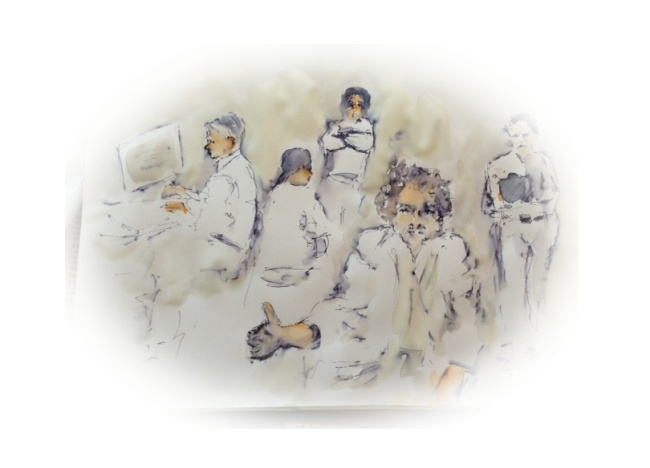Think before you act. That’s culturespeak—dominant culturespeak, some say—for a certain brand of lay-counseling that infiltrates business and industry, schools, anger management classes, parent-child conversations, social cliques, young and old. Feelings? That’s a therapist word. Therapists are often counseling individuals to express feelings, use “I” statements that gird the framework for feelings, the growth of intimacy. Feelings.
Why are feelings important, actually? Many people, especially left-brain bullies who extol the virtues of logic, or compulsive survivalists who ever assert the need for action, often ridicule those who draw attention to an affective (emotional) underpinning to any given issue or conflict. Others still consider that giving weight or time to feelings, especially negative feelings like fear, guilt and shame, is an indulgence—an exercise in what some term “navel-gazing”. Given certain contexts (do I really need to enumerate them?), the weight given to thinking or action is appropriate, but all too often the ethos is extended, given inappropriate width, while underlying feelings are either dismissed or given pat, superficial meanings, such that individuals, couples and families—the world—can move on. The person who exhibits rage, behaves with violence, is likely someone who, when later asked about their feelings, speaks pridefully of feeling “disrespected”, but makes little (if any) space for the likely truer feelings: fear, hope; desires for closeness, the experience of danger or abandonment.
I’d like to give readers a practical example of why acknowledgement of negative feelings is important, and why the sustaining of feeling is also important. It’s a story of a couple that struggles to slow down and really communicate: In this anecdote, a struggling pair has made room in their busy schedules for a “date night”, which will include, among other things, a night of sex. Problem: their evening is intruded upon by one of the countless distractions in their lives. The woman receives a text—someone from work needs a call back. The husband, anticipating (based upon actual past events) that the interruption will be prolonged, sarcastically gripes, “Well, so much for our so-called night of intimacy.” The woman, feeling “disrespected”, assures him she will not be long, but resents his attitude, which she casts as “entitled”. Later she returns to him, and finds that he is pouting. The “date night” proceeds, sex included, but without the earlier goodwill and spontaneity.
In speaking to this couple, I challenge both to recall, possibly experience, consider and then lead with feelings, rather than focusing singularly upon “what do we do.” I challenge the husband to say what he felt when he first learned of his wife’s seeming distraction. “I was disappointed,” he says. Upon some expansion, I ask “What kept you from saying that?”
“I did,” he remonstrates fully believing he’d done all he could to connect with his wife on the night in question. “No you didn’t,” I argue—respectfully: “You made a sarcastic complaint to her, and later ‘pouted’ when she returned, saying little if anything about your true feelings.” He shrugs, transforms his voice into an affected whine, and says, “What am I supposed to say, ‘gee, I’m really disappointed that we’re not having sex’. I can’t say that.”
“Why not?” I counter. This is where the therapy really begins.
“Because that’s not the way I am; not how I was raised, to talk about my feelings.” Note the distancing of opinion, plus the excuse, the implied helplessness: I can’t. For the moment, I ignore the historical dimension (and the affected expressions) and stay in the present.
“Why can’t you say that you’re disappointed, if that’s your true feeling?” After one or two more fumbling replies (this man is at a loss), he says, “I don’t know.”
“What do you mean? You don’t know why you can’t express your true feelings, your full experience?” The man shrugs. I choose to help…this time.
“You were disappointed that a planned evening of intimacy was disrupted. That’s understandable. There was an opportunity to say you were disappointed; to point out that your wife had agreed to devote the evening to a date and not work, and that you were anxious that work seemed more important to her than working on the relationship.”
The man nods, understanding, but looks defeated. “I can’t say all of that. Or, I couldn’t remember all of that. I’m not that articulate. Could you say it again so I can write it down?”
“It’s not about being articulate, or memorizing lines,” I reply quickly. “It is, however, about being in the habit of recognizing your true feelings, staying with them long enough so that thoughts and eventually words, may follow. (BTW: I level a similar confrontation at the wife) You experience a feeling—disappointment, and beneath that, the pain of rejection—and because that feeling seems so difficult to experience, you move to get rid of it as soon as possible. Thus, you use humor, aggressive humor, to distance yourself from both your wife and, more importantly, your own experience.”
** this example is a fiction in one sense, but in another, a coalescing of exchanges noted over time.

